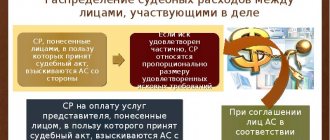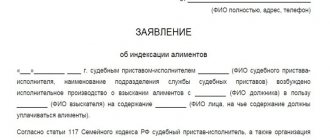Appeal
on the decision of the Arbitration Court dated June 9, 2012
and the decision of the Second Arbitration Court of Appeal dated November 19, 2012.
On June 9, 2012, the Arbitration Court of Kostroma issued a decision in this case, according to which the Plaintiff’s claim against the Defendant for the transfer of the buyer’s rights under the real estate purchase and sale agreement was denied.
By the decision of the Second Appeal Arbitration Court of Kostroma dated November 19, 2012, the decision was left unchanged.
The plaintiff does not agree with the judicial acts adopted in the case and believes that they are subject to cancellation, since the courts, when issuing them, incorrectly applied the norms of substantive law.
In accordance with Part 1 of Art. 250 of the Civil Code of the Russian Federation, when a share in the right of common ownership is sold by one of the co-owners to an outsider, the remaining participants in shared ownership have the preemptive right to purchase the share being sold at the price for which it is sold, and on other equal conditions, except in cases of sale at public auction.
According to Part 3 of Art. 250 of the Civil Code of the Russian Federation, if the sale of a share in common property was carried out in violation of the preemptive right of its purchase by other co-owners, then “any other participant in shared ownership has the right, within three months,” to demand in court the transfer of the rights and obligations of the buyer to him.
On April 5, 2012, the Third Party and the Defendant entered into a purchase and sale agreement for non-residential premises with a total area of 480 square meters. m, which constituted the common shared property of the Claimant and the Third Party in this case, which violated the Claimant’s pre-emptive right to purchase these premises. The Plaintiff learned about the conclusion of this agreement only during the General Meeting of Shareholders of the Third Party on May 4, 2012, at which the Plaintiff was present as a shareholder. Until this moment, the Plaintiff did not have any information about the transaction concluded between the Third Party and the Defendant.
Written notification from a Third Party of the intention to sell its share in the common property of non-residential premises to an outsider in violation of clause 2 of Art. 250 of the Civil Code of the Russian Federation was not sent to the Plaintiff.
By virtue of Art. 195 of the Civil Code of the Russian Federation, the period established by law for applying to court for protection of a violated right is the statute of limitations. The Civil Code of the Russian Federation distinguishes the limitation periods into general (3 years - Article 196) and special periods for certain types of claims, which can be either less or more than three years (Article 197). The limitation period begins from the day when the person learned or should have learned about the violation of his right. Exceptions from this rule can only be established by the Civil Code of the Russian Federation or other laws (clause 1 of Article 200 of the Civil Code of the Russian Federation).
Clause 3 art. 250 of the Civil Code of the Russian Federation does not establish a different procedure for calculating the period for the exercise by a co-owner of the preemptive right to acquire a share in the common property. Since the three-month period established by paragraph 3 of Art. 250 of the Civil Code of the Russian Federation, determines the time during which a participant in shared ownership can go to court to protect his violated right, then this period fully corresponds to that given in Art. 195 of the Civil Code of the Russian Federation determines the limitation period, which means it refers to special limitation periods and should be subject to the norms of the Civil Code of the Russian Federation on the beginning of the period for applying for judicial protection, that is, from the moment when a person learned or should have learned about a violation of his right .
However, the courts, indicating in judicial acts that the three-month period under Art. 250 of the Civil Code of the Russian Federation is preemptive, they did not analyze the Plaintiff’s arguments that the specified three-month period should be calculated from the day when the Plaintiff learned or should have learned about the violation of his right, and not from the date of the transaction.
Thus, the courts did not apply the rule applicable in this case. In accordance with paragraph 2 of Art. 250 of the Civil Code of the Russian Federation, the seller has the obligation to notify in writing the other participants in the common property of his intention to sell his share to an outsider, indicating the essential terms of the transaction. Only if the co-owners refuse or do not acquire ownership of the real estate within a month, the seller can sell his share to any person. The court, without examining the seller’s compliance with the specified requirement of the law, unreasonably applied clause 20 of the Resolution of the Plenum of the Supreme Arbitration Court of the Russian Federation dated February 25, 1998 No. 8.
When giving explanations, the plenum proceeded from the seller’s compliance with the requirements of paragraph 2 of Art. 250 of the Civil Code of the Russian Federation and the Plaintiff’s (co-owner’s) awareness of the transaction. Since the Plaintiff was aware of the transaction being carried out with an outsider, the plenum indicated that the three-month period for transferring the rights and obligations of the buyer under the contract is preemptive and cannot be restored.
The courts did not examine the case materials at all for the purpose of procedural economy, as indicated in the court decision in the case, which violated Art. Art. 168 and 268 of the Arbitration Procedure Code of the Russian Federation.
Based on the above and taking into account that the claim was filed within a three-month period, and also guided by Art. Art. 195 - 197, 200, 250 of the Civil Code of the Russian Federation and Art. 273, 275 - 277 Arbitration Procedure Code of the Russian Federation,
Consideration of cases under simplified proceedings
for claims for the recovery of funds, if the cost of the claim does not exceed five hundred thousand rubles for legal entities, two hundred and fifty thousand rubles for individual entrepreneurs;
2) on challenging non-normative legal acts, decisions of bodies exercising public powers, officials, if the relevant non-normative legal act or decision contains a requirement for the payment of funds or provides for the recovery of funds or foreclosure on other property of the applicant, provided that these acts , the decisions are disputed by the applicant in terms of the requirement to pay money or collect money or foreclose on other property of the applicant and the amount disputed by the applicant does not exceed one hundred thousand rubles; 3) on bringing to administrative liability, if for committing an administrative offense an administrative penalty is imposed only in the form of an administrative fine, the maximum amount of which does not exceed one hundred thousand rubles; 4) to challenge the decisions of administrative bodies to bring to administrative liability, if an administrative penalty has been imposed for committing an administrative offense only in the form of an administrative fine, the amount of which does not exceed one hundred thousand rubles; Information about changes: Federal Law of March 2, 2021
Reconsideration of a case based on newly discovered circumstances is an extraordinary procedure, the use of which, in order to ensure the principle of stability of judicial decisions, is permissible only in exceptional cases in order to protect the rights of the person citing newly discovered circumstances, and should not violate the balance of interests of the parties based on these acts.
Essence: supervision of the legality and validity of judicial acts when the arbitration court that issued them receives information about the presence of newly discovered circumstances. Circumstances that arose or changed after the issuance of a judicial act cannot be the basis for revising the judicial act due to newly discovered circumstances; their emergence may serve as a basis for filing a new claim.
The significance of the institution: -an additional guarantee of justice and fairness of judicial acts and, consequently, the protection of the rights of each subject of legal relations in the field of business and other economic activities. - allows the use of a simpler and more efficient form of judicial supervision than others provided for by the APC.
-The Constitutional Court of the Russian Federation, noting the exceptional nature of this stage, indicated that it makes it possible to eliminate judicial errors that were not and could not be identified earlier
New circumstances: circumstances that arose after the adoption of a judicial act, but are essential for the correct resolution of the case.
We invite you to read: How to obtain guardianship over an elderly person in the Republic of Belarus
Newly discovered: legal facts (actual circumstances) that objectively existed at the time the judicial act was issued, but were not and could not be known to the court, as well as to the person participating in the case who applied for a review of the judicial act.
Powers of the arbitration court of cassation
The powers of the arbitration court of cassation represent a set of rights to perform procedural actions established by law regarding the decisions, resolutions and rulings of the arbitration courts of the first and appellate instances that have entered into legal force.
In accordance with Art. 287 of the Arbitration Procedure Code of the Russian Federation, the arbitration court of the cassation instance, based on the results of consideration of the cassation appeal, has the right to:
- leave the decision of the arbitration court of first instance and (or) the decision of the appellate court unchanged, and the cassation appeal not satisfied;
- cancel or change the decision of the court of first instance and (or) the decision of the court of appeal in whole or in part and, without remitting the case for a new trial, adopt a new judicial act if the factual circumstances relevant to the case are established by the arbitration court of the first and appellate instances on on the basis of a full and comprehensive study of the evidence available in the case, but this court incorrectly applied the rule of law or the legality of the decision, the decision of the arbitration court of the first and appellate instances is re-checked by the arbitration court of cassation in the absence of the grounds provided for in paragraph 3 of part 1 of Art. 287 Arbitration Procedure Code of the Russian Federation;
- cancel or change the decision of the court of first instance and (or) the decision of the appellate court in whole or in part and send the case for a new trial to the relevant arbitration court, the decision, decision of which was canceled or changed, if this court violated the rules of procedural law that are in accordance with Part 4 Art. 288 of the Arbitration Procedure Code of the Russian Federation as a basis for canceling a decision, resolution, or if the conclusions contained in the appealed decision or resolution do not correspond to the factual circumstances established in the case or the evidence available in the case. When sending a case for a new trial, the court may indicate the need to consider the case by a collegial composition of judges and (or) in a different judicial composition;
- cancel or change the decision of the court of first instance and (or) the decision of the court of appeal in whole or in part and transfer the case to another arbitration court of the first or appellate instance within the same judicial district, if these judicial acts are re-verified by the arbitration court of cassation and the conclusions contained therein do not correspond to the factual circumstances established in the case or the evidence available in the case;
- leave in force one of the previously adopted decisions or resolutions in the case;
- cancel the decision of the court of first instance and (or) the decision of the court of appeal in whole or in part and terminate the proceedings in the case or leave the statement of claim without consideration in whole or in part.
An important difference between the cassation instance and the appellate instance, as mentioned earlier, is that the cassation instance does not have the right to establish or consider as proven circumstances that were not established in the decision or resolution or were rejected by the court of the first or appellate instance, to prejudge questions of reliability or unreliability this or that evidence, the superiority of some evidence over others, what rule of substantive law should be applied and what decision or resolution should be made when the case is reconsidered.
The grounds for changing or canceling a decision, ruling of the arbitration court of the first and appellate instances, according to Art. 288 of the Arbitration Procedure Code of the Russian Federation, are the discrepancy between the court’s conclusions contained in the decision, resolution, the actual circumstances of the case established by the arbitration court of the first and appellate instances, and the evidence available in the case, violation or incorrect application of substantive law or procedural law.







